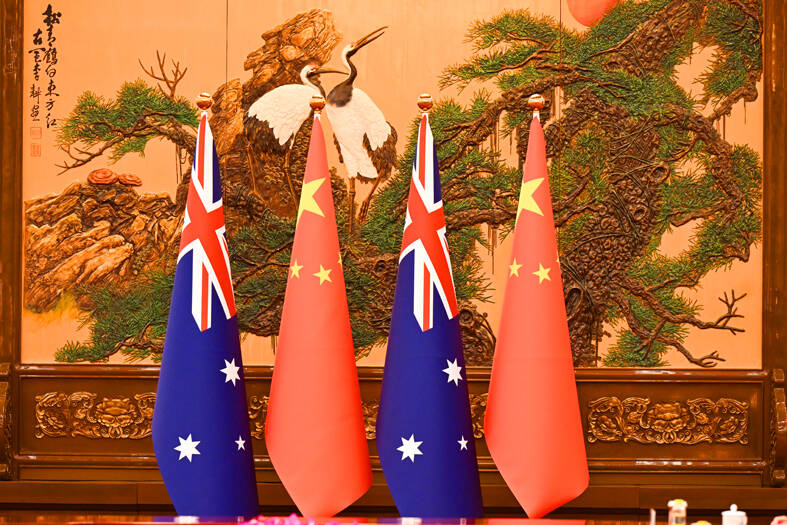New Zealand is facing the toughest national security challenges of recent times, with increasing threats of foreign interference and espionage, particularly from China, an intelligence report released yesterday showed.
There was almost certainly undetected espionage activity harming the country’s interests, and foreign states continue to target critical organizations, infrastructure and technology to steal sensitive information, New Zealand’s Security Intelligence Service report said.
“Some states, including China, Russia and Iran, are willing to engage in covert or deceptive activity in order to influence discussions and decisions, or gain access to technology and information that can help them meet these goals ... New Zealand has been targeted by some of these activities,” the report said.

Photo: EPA
China was a particularly “assertive and powerful” actor in the region and had demonstrated a willingness and capability to undertake intelligence activity that targets New Zealand’s national interests, it added.
A spokesperson for the Chinese embassy in New Zealand said that the content of the report was entirely “unsubstantiated and groundless, saturated with ideological bias and a Cold War mentality.”
China is willing to continue to regard New Zealand as a friend and partner, but in the face of “groundless attacks,” it would, when necessary, “take firm measures to safeguard our legitimate interests,” they said.
The report, titled “New Zealand’s Security Threat Environment,” is released annually as part of a government shift to better inform New Zealanders about risks the country is facing.
New Zealand has increasingly amped up its rhetoric over the growing influence of China in the region and a rise in geopolitical tensions, and yesterday said it would spend NZ$2.7 billion (US$1.6 billion) to beef up its defense force.
New Zealand Security Intelligence Service Director-General Andrew Hampton said the threats need to be taken much more seriously than they are currently.
The report also pointed to the growing threat of violent extremism, and said the most plausible attack scenario remains a lone actor who has been radicalized online.
“Grievances and polarizing issues in the online information space are almost certainly driving support for a range of violent extremist ideologies within New Zealand,” the report said.
Meanwhile, China accused the agency yesterday of rehashing “smears and slanders.”
New Zealand’s allegations aimed to sow suspicion, “poisoning” the two countries’ relations, the Chinese embassy’s spokesperson said.

MILITARY BOOST: The procurement was planned after Washington recommended that Taiwan increase its stock of air defense missiles, a defense official said yesterday Taiwan is planning to order an additional four PAC-3 MSE systems and up to 500 missiles in response to an increasing number of missile sites on China’s east coast, a defense official said yesterday. The official, who spoke on condition of anonymity, said that the proposed order would be placed using the defense procurement special budget, adding that about NT$1 trillion (US$32,88 billion) has been allocated for the budget. The proposed acquisition would include launchers, missiles, and a lower tier air and missile defense radar system, they said The procurement was planned after the US military recommended that Taiwan increase

POLITICAL AGENDA: Beijing’s cross-strait Mid-Autumn Festival events are part of a ‘cultural united front’ aimed at promoting unification with Taiwan, academics said Local authorities in China have been inviting Taiwanese to participate in cross-strait Mid-Autumn Festival celebrations centered around ideals of “family and nation,” a move Taiwanese academics said politicizes the holiday to promote the idea of “one family” across the Taiwan Strait. Sources said that China’s Fujian Provincial Government is organizing about 20 cross-strait-themed events in cities including Quanzhou, Nanping, Sanming and Zhangzhou. In Zhangzhou, a festival scheduled for Wednesday is to showcase Minnan-language songs and budaixi (布袋戲) glove puppetry to highlight cultural similarities between Taiwan and the region. Elsewhere, Jiangsu Province is hosting more than 10 similar celebrations in Taizhou, Changzhou, Suzhou,

TWO HEAVYWEIGHTS: Trump and Xi respect each other, are in a unique position to do something great, and they want to do that together, the US envoy to China said The administration of US President Donald Trump has told Chinese President Xi Jinping (習近平) “we don’t want any coercion, but we want [the Taiwan dispute] resolved peacefully,” US ambassador to China David Perdue said in a TV interview on Thursday. Trump “has said very clearly, we are not changing the ‘one China’ policy, we are going to adhere to the Taiwan Relations Act, the three communiques and the ‘six assurances’ that were done under [former US president Ronald] Reagan,” Perdue told Joe Kernen, cohost of CNBC’s Squawk Box. The act, the Three Joint Communiques and the “six assurances” are guidelines for Washington

DEEPENING TIES: The two are boosting cooperation in response to China’s coercive actions and have signed MOUs on search-and-rescue and anti-smuggling efforts Taiwan and Japan are moving to normalize joint coast guard training and considering the inclusion of other allies, the Japanese Yomiuri Shimbun reported yesterday. Both nations’ coast guards in June sent vessels to the seas south of the Sakishima Islands to conduct joint training, the report said, adding that it was the second joint maritime training exercise since the nations severed formal diplomatic ties in September 1972. Japan dispatched the Nagoya Coast Guard’s Mizuho, a 134m, 6,000-tonne patrol vessel which can carry a helicopter, while the Coast Guard Administration (CGA) sent the 126m, 4,000-tonne Yunlin, one of its largest vessels, the report